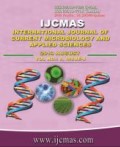


 National Academy of Agricultural Sciences (NAAS)
National Academy of Agricultural Sciences (NAAS)

|
PRINT ISSN : 2319-7692
Online ISSN : 2319-7706 Issues : 12 per year Publisher : Excellent Publishers Email : editorijcmas@gmail.com / submit@ijcmas.com Editor-in-chief: Dr.M.Prakash Index Copernicus ICV 2018: 95.39 NAAS RATING 2020: 5.38 |
The experiment was conducted at College of Horticulture and Forestry, Central Agricultural University, Pasighat, Arunachal Pradesh to study the effect of integrated nutrient management on growth and yield of cucumber (Cucumis sativus L.) grown under protected condition. It was laid out in Randomized Block Design comprising of thirteen treatments replicated thrice. The experiment was conducted during the off season with gynoecious hybrid variety KSP-1301. Integration of inorganic fertilizers, organic manures and biofertilizers has increased the efficacy of the nutrients in the soil. Integration of vermicompost with inorganic fertilizers and microbial inoculants has efficiently contributed in mineralisation of unavailable forms of nutrient to the available form. The results revealed that the vines of cucumber fertilized with T5 (75% of RDF of NPK + vermicompost @ 7.5 t/ha) recorded maximum vine length (190.26 cm), number of branches per plant (12.97) and internodal length (13.86 cm). However, the superior response in terms of flowering and the yield attributing parameters like minimum days to 50% flowering (34.01), minimum days to 50% fruiting (45.01), fruit length (16.20 cm), fruit breadth (4.21 cm), fruit girth (13.18 cm), fruit weight (197.39 g), yield of fruits per vine (1.75 kg), yield of fruits per plot (12.43 kg), number of fruits per vine (10.81), number of fruits per plot (91.51) and total yield (287.89 q/ha) was recorded from T13 (50% of RDF of NPK + vermicompost @ 5 t/ha + Azotobacter @ 5 kg/ha + PSB @ 5 kg/ha).
 |
 |
 |
 |
 |